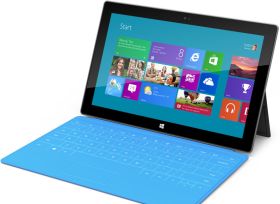'No surprises' in Microsoft Surface tablet software

Microsoft's new Surface tablet deploys the same desktop and RT versions of Windows 8 and this is likely to confuse consumers, say market analyst Ovum, which adds Redmond's move to launch its own tablet and compete with OEM partners is "rarely a good idea".
In a statement released Tuesday, Ovum's chief telecoms analyst Jan Dawson said there were "no surprises" in the software that will run on the new Microsoft tablet, which will be powered by both version of Windows 8.

Dawson said: "Nothing has changed there and it still looks like a huge break with the past on the surface, but with a jarring switch back to the old desktop world hidden beneath.
"In theory, it delivers all the benefits of both the tablet-optimized environment and the classic desktop approach and apps, but in reality, the versions available to try at the moment are a horrible mishmash of the two worlds that is likely to be confusing for the consumer."
In a break away from its traditional practice of depending on hardware makers to offer products running its Windows operating system, Microsoft early-Tuesday unveiled two of its own tablets under the Surface brand. No details on pricing or availability were provided but Redmond said in its press release: "Suggested retail pricing will be announced closer to availability and is expected to be competitive with a comparable ARM tablet or Intel Ultrabook-class PC. OEMs will have cost and feature parity on Windows 8 and Windows RT."
Surface for Windows RT is a 10.6-inch device, configurable in 32GB or 64GB, that will be bundled with Office Home & Student 2013 RT and include support for a magnetically attachable cover that allows users to touch-type.
Surface for Windows 8 also sports a 10.6-inch display and includes the same attachable cover. It will be available in 64GB or 128GB, and will also provide pen support.
While Microsoft-branded, the tablets will not actually be manufactured by Redmond. No details were available on which manufacturers will be producing the devices, but reports earlier this month suggested HTC had been excluded.
Faceoff with OEM partners
Microsoft's move to launch its own brand of tablets would upset its OEM partners, Dawson noted, adding it "is rarely a good idea" for an OS owner to compete with its OEM partners.
"Either they not happy with the devices out there, or they are not satisfied with only taking a license fee from selling Windows-based tablets. Either way, it is a huge vote of no confidence in its OEM partners, who should rightly feel slighted," the Ovum analyst said.
"The device itself looks compelling, but as usual we are left without pricing information, making it impossible to judge for certain what the market impact will be," he added.
He noted Windows had a huge installed base and IT managers could see the tablets as a replacement for the Windows computer.
However, whether the devices would garner much consumer interest would depend on price and Microsoft's ability to fix the poor user interface experience in Windows 8 and Windows RT, Dawson surmised.
According to ABI Research, Apple and Samsung topped the worldwide tablet market in the first quarter of 2012, which saw shipments reach 18.2 million. Apple moved 11.8 million in shipments, driven in large by the launch of its latest iPad in March, while Samsung clocked 1.1 million shipments for the quarter.
Gartner estimates global tablet shipments will hit 118.9 million units this year, a 98 percent jump from 60 million last year.